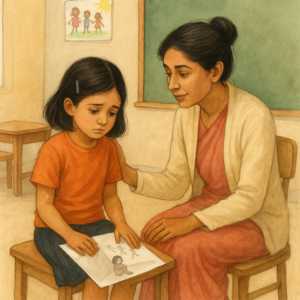By Pranti Pradhan
The Teacher Who Understood Ira

There was once a cheerful girl named Ira,
but in class, she was always talking, laughing loudly, sometimes even shouting.
She would poke her friends, run around, and never sit still.
Teachers got tired of her.
“Why can’t you behave like others?” they would say.
She had to stand outside, lost her lunch breaks, and was called “naughty.”
But one day, a new teacher joined. Her name was Miss Anaya.
Everyone waited to see what she would do with Ira.
That day, Ira talked again during the lesson.
But Miss Anaya didn’t shout. She just said calmly,
“Ira, I’ll talk to you after class.”
Ira felt scared. “Now I’ll be punished again,” she thought.
But after class, Miss Anaya didn’t scold.
She sat next to Ira and asked gently,
“Do you feel bored in class sometimes?”
“Is something bothering you?”
Ira looked down. She didn’t answer.
Miss Anaya smiled and said,
“Would you like to draw something for me tomorrow?
Anything you feel or like.”
The next day, Ira brought a drawing.
It showed a girl sitting alone in one corner,
while other children played.
Miss Anaya looked at it carefully and asked,
“Is that you in the picture?”
Ira nodded.
She said quietly,
“At home, no one plays with me.
My mom is busy with my baby brother.
Sometimes I feel nobody listens.”
Miss Anaya placed a hand on hers.
“I’m listening,” she said.
After that day, everything slowly changed.
Miss Anaya made Ira the “class helper.”
She gave her a little notebook to write her thoughts.
She asked her to help younger children tie their shoelaces,
or pass the books during reading time.
Bit by bit, Ira talked less in the middle of lessons
—and started shining in small, kind ways.
Not because she was forced.
But because she felt seen, heard, and loved.
🌟Moral of the Story🌟
Sometimes what we call “naughtiness” is just a child saying,
“I need someone to notice me.”
Children don’t change with scolding.
They change when someone understands why they behave the way they do—
and gives them a chance to be themselves in a better way.



